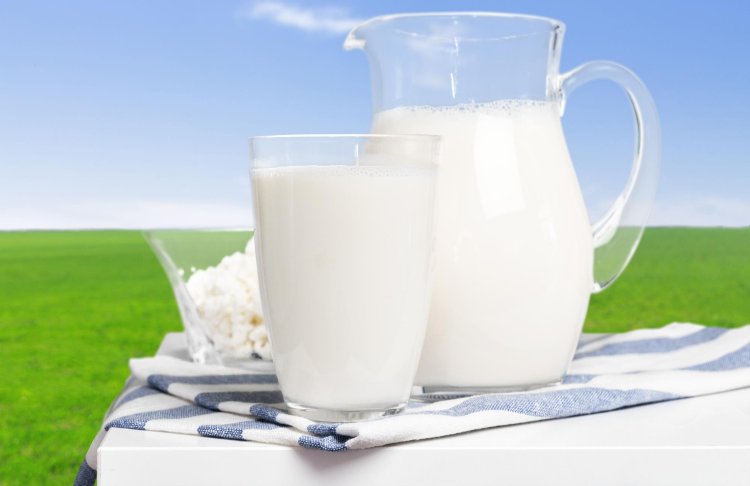Milk: Nature's Complete Beverage for Health and Wellness
Milk is a nutrient-rich liquid produced by mammals for the nourishment of their young. In human nutrition, milk has been a staple food for millennia, valued not only for its nutritional content but also for its versatility in culinary applications and cultural significance.

Composition of Milk
Milk is primarily composed of water (about 87%) and solids (about 13%), which include proteins, carbohydrates, fats, vitamins, and minerals. Here’s a breakdown of the major components and their nutritional significance:
Proteins
Milk contains two main types of proteins:
Casein
- Comprising about 80% of the total protein content, casein is a slow-digesting protein that provides a sustained release of amino acids.
Whey
- Making up approximately 20% of the protein in milk, whey is a fast-digesting protein that is quickly absorbed into the bloodstream. It is rich in essential amino acids, particularly leucine, which is crucial for muscle protein synthesis.
Carbohydrates
The primary carbohydrate in milk is lactose, a disaccharide composed of glucose and galactose. Lactose provides energy and facilitates the absorption of calcium.
Fats
Milk contains a mix of saturated, monounsaturated, and polyunsaturated fats. These fats serve as a concentrated source of energy and are carriers for fat-soluble vitamins like vitamin A, D, E, and K.
Vitamins
Milk is rich in several vitamins essential for health:
Vitamin A
- Important for vision, immune function, and skin health.
Vitamin D
- Facilitates the absorption of calcium and phosphorus, vital for bone health.
Vitamin B12
- Necessary for the formation of red blood cells and nerve function.
Riboflavin (Vitamin B2)
- Supports energy production and antioxidant function.
Minerals
Milk is a good source of minerals such as calcium, phosphorus, potassium, and magnesium, all of which are vital for bone health, muscle function, and overall well-being.
Health Effects of Milk Consumption
Consuming milk offers numerous health benefits:
Bone Health
Milk is renowned for its calcium content, which is essential for building and maintaining strong bones and teeth. Vitamin D in milk aids in calcium absorption, further supporting bone health and reducing the risk of osteoporosis.
Muscle Growth and Repair
The high-quality proteins in milk, particularly whey and casein, provide the essential amino acids needed for muscle growth, repair, and maintenance. This makes milk an excellent post-exercise recovery drink.
Heart Health
Some studies suggest that moderate dairy consumption may contribute to a reduced risk of cardiovascular diseases, although the relationship is complex and varies among individuals.
Weight Management
The protein content in milk can contribute to satiety, helping individuals feel fuller for longer periods. This may aid in weight management when milk is consumed as part of a balanced diet.
Culinary Uses of Milk
Milk is an incredibly versatile ingredient in culinary practices worldwide:
Beverage
Milk is commonly consumed as a beverage, whether plain or flavored. It serves as a foundational component of breakfast routines and is frequently used to accompany hot beverages such as coffee and tea.
Cooking and Baking
Milk plays a crucial role in cooking and baking. Its proteins and fats contribute to the texture, flavor, and moisture of various dishes, including soups, sauces, pancakes, cakes, and cookies.
Dairy Products
Milk serves as the base for numerous dairy products that are enjoyed globally:
Cheese
Produced by curdling milk and separating the curds from the whey, cheese comes in countless varieties with distinct flavors and textures.
Yogurt
Fermented milk product that offers probiotics and nutrients beneficial for gut health.
Butter
Made from churning milk or cream, butter is widely used in cooking and baking for its rich flavor and texture.
Ice Cream
A popular frozen dairy dessert enjoyed for its creamy consistency and wide range of flavors.
Cultural and Economic Significance
Milk holds significant cultural and economic importance globally:
Cultural Symbolism
In many cultures, milk symbolizes purity, health, and maternal nurturing. It plays roles in religious ceremonies, traditional cuisines, and daily dietary practices.
Economic Impact
Dairy farming and milk production support millions of livelihoods worldwide. The dairy industry contributes significantly to agricultural economies, providing employment, income, and food security.
Concerns and Controversies
Despite its nutritional benefits, milk consumption raises several concerns:
Lactose Intolerance
Many individuals globally are lactose intolerant, lacking the enzyme lactase needed to digest lactose properly. This can lead to digestive discomfort such as bloating, gas, and diarrhea.
Milk Allergies
Some people have allergies to milk proteins (casein and whey), which can cause allergic reactions ranging from mild (hives) to severe (anaphylaxis).
Environmental Impact
Dairy farming can have environmental consequences, including greenhouse gas emissions, land use, and water consumption. Sustainable practices and innovations are being explored to mitigate these impacts.
Ethical Considerations
Concerns about animal welfare in industrialized dairy farming have led to debates about ethical practices, including the treatment of dairy cows and the environmental footprint of dairy production.
In conclusion, milk remains a cornerstone of human nutrition and culinary practices worldwide. From its rich nutrient profile to its versatility in cooking and its cultural significance, milk continues to play a vital role in diets across diverse populations. While debates and challenges persist regarding its consumption and production, ongoing research and innovations aim to address concerns and promote sustainable dairy practices.
Disclaimer: The information provided in this article is for educational purposes only and should not be considered medical advice. If you have any health concerns or are experiencing symptoms, it is important to consult with a healthcare professional, such as a doctor or clinic, for proper diagnosis and treatment. Always seek the advice of your doctor or other qualified health provider with any questions you may have regarding a medical condition. Do not disregard professional medical advice or delay in seeking it because of something you have read in this article.
#MilkNutrition #HealthBenefits #CulinaryUses #CulturalSignificance #DairyProducts #LactoseIntolerance #EnvironmentalImpact #EthicalConsiderations #HealthTips #FoodFacts
What's Your Reaction?





















